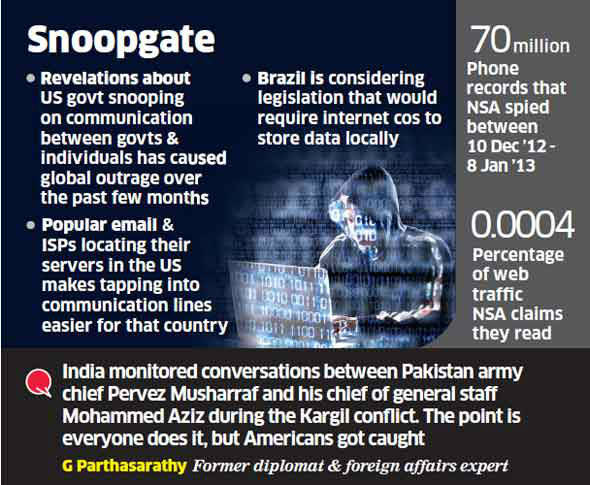India must support UN's e-snooping move: Human rights activists
India is facing pressure from internet and human rights activists to support a United Nations resolution that calls for an end to electronic spying after revelations of mass illegal surveillance by the United States.
The article by Indu Nandakumar was published in the Economic Times on November 11, 2013. Sunil Abraham is quoted.
The resolution, jointly submitted by Brazil and Germany - vocal opponents of US cyber spying - urged UN member states to act against excessive surveillance. Records leaked by whistleblower Edward Snowden had exposed US eavesdropping on Brazil's President Dilma Rousseff and German Chancellor Angela Merkel.
Internet activists and experts said the world's largest democracy must join the resolution as a reaction to unfair surveillance by the US. Confidential documents from Snowden, a former US National Security Agency contractor showed India was one of the victims of US snooping.
"Decision-makers in India haven't made a principled stand on the issue. They are still debating and deliberating," said Oleg Demidov, program director for international information security and global internet governance at the Russian Center for Policy Studies.
Demidov said India was unlikely to join the resolution as it has strong language and measures that need to be implemented immediately. "Joining this would mean a big political step." The resolution, while not legally binding, can still be a formal vote against US spying. A senior government official in New Delhi said Brazil and Germany on Friday held consultations with all UN member states including India on the draft resolution.
India will take 'detailed' look
He said India will take a "detailed look" at the resolution over the coming days before deciding whether it wants to be part of it. Revelations about US government snooping on communication between governments and individuals has caused global outrage over the past few months.
Popular email and internet service providers locating their servers in the US makes tapping into communication lines easier for that country. Brazil is considering legislation that would require internet companies to store data locally.
Latest documents revealed by Snowden showed that NSA had been monitoring data that travels between servers of Yahoo and Google, thus accessing personal data of millions of internet users across the world, including Indian users. It had prompted strong reaction from Google, whose executive chairman Eric Schimdt called such snooping "outrageous."
A representative for the German federal foreign office said the resolution was submitted to "protect human rights in the digital age more effectively" and that all member states are invited to co-sponsor the resolution.
"Indians should press their own government to forcefully object to the United States' surveillance policies and demand that those policies be brought into conformity with international law," said Jameel Jaffer, deputy legal director of the American Civil Liberties Union, an influential civil rights union based in New York. Jaffer said while no one questions the US government's right to engage judicially supervised surveillance, "dragnet surveillance of entire populations is a severe and unnecessary infringement on the privacy of millions."
He said that reforming the policies of NSA would require pressure from outside the US, especially foreign governments.
The pushback against mass surveillance is taking place in the backdrop of India and US looking to strengthen their economic relationship. Issues such as the US immigration reform bill which is seen as detrimental by India's $75 billion softw are export industry, and India's nuclear liability law, which US companies find unreasonable, have been irritants in bilateral relations.
Another senior government official said India's stance on US surveillance has been soft as any discussion on the subject would bring India's Central Monitoring System into the spotlight. The system, similar to the US government's PRISM project, gives the government access to phone calls, text messages and even social media conversations of individuals.
Sunil Abraham, executive director of Bangalore based think-tank Centre for Internet and Society, said India must be a part of the efforts by Brazil and Germany.
 |
|---|
"Surveillance needs to be addressed both at technological as well as policy levels." Former diplomat and foreign affairs expert G Parthasarathy acknowledged the need for international consensus to protect individual privacy but doubted whether snooping by governments will ever end.
"Yes, the Americans are over-doing it, but India cannot condemn it because we have been doing the same thing. India monitored conversations between (Pakistan army chief) Pervez Musharraf and his chief of general staff (Mohammed Aziz) during the Kargil conflict. The point is everyone does it, but Americans got caught."

